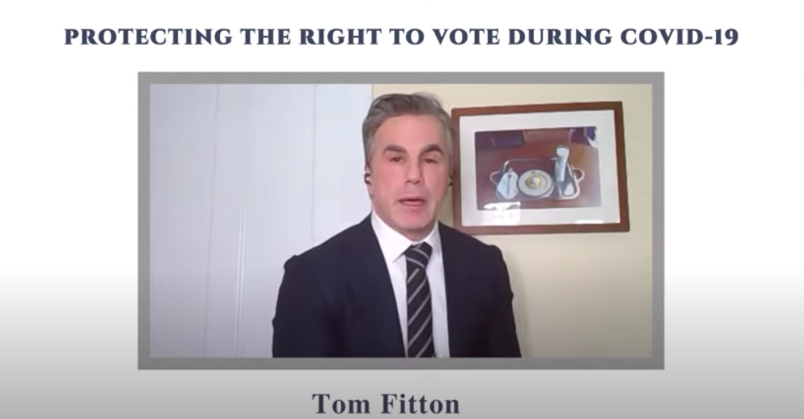Conservatives have finally found a form of voter suppression they won’t stand for: warnings from Democrats that voting in person during the pandemic could be dangerous to one’s health.
The issue came up repeatedly at Wednesday House hearing about the voting in the pandemic, which featured testimony from some of the most well-known figures in the battles over voting rights.
Some of the witnesses raised concerns about burdens that ID requirements and other logistical hurdles posed for voters who would prefer to vote by mail, given the current coronavirus outbreak.
But Tom Fitton — the head of the far-right group Judicial Watch, which has baselessly fanned the fears about voter fraud — said the real voter suppression was the “inflammatory” rhetoric about the risks of in-person voting during the pandemic.
He seemed to be referring to testimony from his fellow witness, Stacey Abrams, and to comments made by Rep. Steve Cohen (D-TN), the chair of the House Judiciary subcommittee hosting the hearing.
“To hear inflammatory rhetoric that you’re choosing your life over your vote, it’s just not appropriate,” Fitton said. “And it causes people to be nervous about voting. That is as suppressive as anything I’ve heard, telling people they’re going to die or likely to die if they vote.”
Since the outbreak, voter advocates like Abrams, who leads the group Fair Fight Action, have pushed for easier access to absentee voting to cut down on the risk of COVID-19 transmission crowded polling places.
“I advocate for mail-in balloting in the 2020 election in response to the COVID pandemic, that allows every eligible American the option to mail in their ballot rather than put their life at risk by standing in a crowded line,” Abrams said Wednesday.
But they’ve also stressed that mail-in voting isn’t a silver bullet, and that in-person options still need to be available, particularly for voters with disabilities and others who might run into issues voting absentee.
Fitton, meanwhile, claimed that voting-by-mail was one of the least secure ways to vote (second only to voting online, according to his comments) and that, “If you want to be sure your vote is counted, the best way to do it is to show up in person.”
“We see that people will exercise their First Amendment rights if they think it is important,” Fitton later added. “Voting is important, and they will vote in person, and they should vote in person without being scared to death about doing it.”
Later on in the hearing, in response to questioning from Rep. Ben Cline (R-VA), Fitton doubled down on the line of attack, accusing Democrats of “confusing people” in their efforts to loosen absentee ballot restrictions.
“They can pursue mail-in ballots as appropriate if they need to, but we should be encouraging people to vote in person, that’s the best way to be sure that voters are secure and counted,” Fitton said.
Fitton’s claim that the pandemic voting health concerns were being overhyped was echoed by Rep. Doug Collins (R-GA).
Collins pressed Abrams on how she described the fallout of Wisconsin’s April election, where thousands waited in line to cast ballots in person after courts blocked efforts to delay the election and to expand the deadline for absentee voting.
Abrams, in her opening statement, cited a report connecting 71 COVID-19 cases to that election, and said that it was “uncontroverted that crowded polling places pose a risk for voters.”
Collins challenged her on whether that risk was really “uncontroverted.”
“There may have been 71 cases, as you said, but there’s been no rise overall,” Collins said, referring to a Stanford report concluding there was no surge in cases after the election. “And the question is of those 71 [cases], can it be definitively determined that they [caught it] at the voting place?”
Earlier in the hearing, Fitton likewise had called concerns about coronavirus’ spread during the Wisconsin election “overblown.”
As other witnesses noted during the hearing, the shift toward absentee voting isn’t just about protecting the individual voter’s health. Poll workers tend to be the types of seniors who face the most serious risks in contracting COVID-19. Scores of polling places have been closed across the country due to staffing issues related to the outbreak. That, in turn, has compounded the need to keep in-person Election Day voting to a manageable level, through mail-in and early voting.
Rep. Jamie Raskin (D-MD) pushed back at Fitton’s skepticism toward the health risks of pandemic in-person voting.
“Come on, get real. To have Mr. Fitton come out here and say that concerns about COVID-19 are overblown is just extraordinary and baffling to me. I suppose no one in his family or no one he knows has been affected by COVID-19, but the idea that it is overblown is just outrageous.”
Correction: A previous version story misattributed Fitton’s line about “confusing” voters to Rep. Ben Cline (R-VA), who had asked the question prompting that comment from Fitton.







Well, if anyone would know about voter suppression, it’s the GOP.
They’ve had decades of malpractice…
1300 dead from Covid-19 yesterday, 540 today and the day’s not over.
And things sure ain’t getting better in AZ
Fitton is a charlatan and conspiracy theorist. He has nothing of value to offer to any hearing.
That’s rich.
"It’s a travesty of a mockery of a sham of a mockery of a travesty of two mockeries of a sham!"
Then the way to defeat the evil Democrats is to make sure all the vulnerable voters from the Republican side can vote at no cost through the US Postal Service. Brilliant! We should get massive bi-partisan support for that.